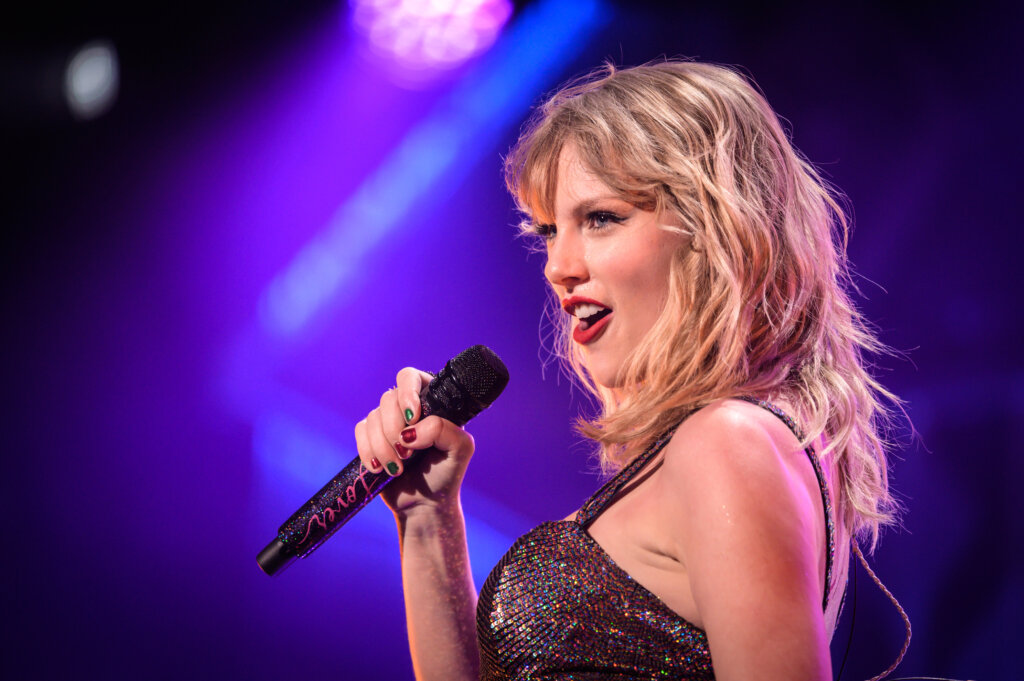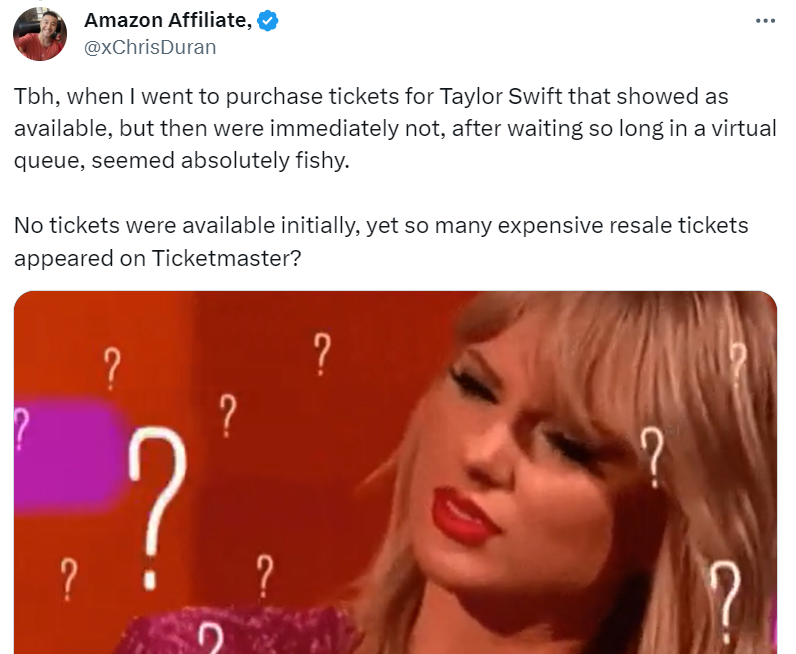
Senators introduce Fans First Act against live entertainment bot scalpers. (Source – Shutterstock).
Senators ‘Speak Now’ with ‘Fans First Act’ against bots and scalpers in live entertainment
- Live entertainment hits financial peak in 2023.
- Live entertainment also grapples with bots and scalpers – especially in the event of big artists.
- Senators introduce Fans First Act, a response to ticket bots and scalping.
The live entertainment industry experienced a remarkable surge in 2023, setting new records and redefining success in the sector. This year stood out as a milestone, significantly outperforming the achievements of 2022 and reshaping the landscape of live events. The unprecedented growth in this sector was not just in revenue, but also in the scale and impact of the events that took place.
Financial triumphs in the live entertainment industry
In 2023, the live industry witnessed a spectacular rise in financial success. Pollstar reported that the top 100 worldwide tours alone saw a 46% increase in total revenue, reaching an astounding US$9.17 billion, up from US$6.28 billion in the previous year.
This financial upswing was evident in the average revenue per show, which saw a substantial 53.2% increase. While the growth in audience numbers was less pronounced compared to the financial figures, it was still significant, with total ticket sales climbing by 18.4% and the average number of tickets sold per show increasing by 24.25%. Reflecting the overall trend, ticket prices also rose by 23.33% on average.
This extraordinary growth was driven in part by several high-profile tours. Notably, Taylor Swift’s “Eras Tour,” Beyoncé’s “Renaissance Tour,” and Bruce Springsteen’s “Springsteen and E Street Band 2023 Tour” were standout successes. Together, these tours contributed significantly to the industry’s earnings, accounting for over 21.8% of the total gross of the top 100 tours – nearly US$2 billion.
Taylor Swift’s tour was monumental, grossing over US$1 billion across 60 stadiums, a feat never before achieved in tour history. Beyoncé’s tour also made waves by grossing US$580 million from 56 shows, surpassing Bad Bunny’s 2022 record. Bruce Springsteen, with a gross of US$379.5 million and a relatively modest average ticket price, also made a significant impact in the industry. However, the massive success of these tours brought with it the challenges of ticket scalping, and in 2023, that translated heavily into bot activity.
The prevalence of ticket bots and scalpers has become a major issue. Imperva’s 2023 Bad Bot Report reveals that a significant portion of traffic to entertainment websites is automated, much of it attributed to sophisticated bots used for bulk-buying and reselling tickets at inflated prices.
Scalpers frequently use these sophisticated bots to bulk-buy popular event tickets and resell them at inflated prices. That in turn disadvantages genuine fans and harms the live entertainment industry by leading to revenue losses, customer dissatisfaction, and reputational damage.
Bot attacks can harm customer trust and loyalty, potentially impacting long-term sales even if there’s no immediate drop in revenue. This erosion of customer lifetime value can be significantly detrimental to brand reputation. Scammers typically target tickets due to their high resale value, which offers high returns for minimal effort. This situation often leaves ticket vendors and dedicated customers, as exemplified in the Taylor Swift case, bearing the brunt of the consequences.
But the issue extends beyond ticket sales for popular shows and affects other industries, such as must-have clothing and footwear, especially during releases of limited-edition items like special sneakers.
In response to these challenges and in the wake of high-profile incidents like the Taylor Swift ticketing debacle, US senators introduced the Fans First Act. The move highlights the need for regulatory measures to protect consumers and ensure fair access to live entertainment events.

Tackling the likes of the Taylor Swift ticketing debacle. (Source – Shutterstock)
Legislative response: the Fans First Act
The proposed Fans First Act introduces stringent measures against ticket resellers, enhances safeguards against bots that unfairly acquire tickets, and mandates that ticket sellers display comprehensive pricing, including all fees, in their listings. This bipartisan legislation aims to regulate secondary ticket markets, providing clearer pricing information for buyers and equipping the government with better tools to combat illicit ticket sales practices.
According to CNN, while the bill targets the malpractices of ticket resellers and bots, it overlooks specific consumer group demands, potentially failing to address the criticisms leveled at major primary sellers like Ticketmaster. The frustration with Ticketmaster, which escalated after a malfunction during the sale of Taylor Swift’s tour tickets, led to congressional scrutiny and public disapproval from the artist herself.
The bill does embrace some consumer group suggestions like inclusive pricing, but it seems to omit other requested reforms, such as the flexibility for ticket holders to transfer or resell their tickets at different prices.

Fans are questioning Ticketmaster on a suspicious move. (Source – X)
Brian Hess from the Ticket Buyers Bill of Rights, a consumer advocacy organization, praised the bill for its significant consumer protections, expressing eagerness to keep fans central in the legislative process. A statement from the company supported the Fans First Act, highlighting the importance of legislation that reforms the live event ticketing market and combats predatory resale practices. The company advocates for comprehensive pricing, prohibiting speculative ticketing, deceptive websites, and other reforms, anticipating continued collaboration with policymakers.
The bill’s sponsors emphasize that it is part of broader ticketing legislation efforts. Senator John Cornyn, a Republican from Texas and one of the bill’s primary authors, noted the bill’s aim to restore trust in the ticketing system by addressing issues like bots, price gouging, and lack of price transparency.
Senator Amy Klobuchar, a Democrat from Minnesota and another leading co-sponsor, highlighted provisions in the bill for refund guarantees for canceled shows and a ban on speculative ticket sales. Senator Marsha Blackburn, a Republican from Tennessee, pointed out that the Fans First Act builds upon previous legislation to improve ticket sale transparency and strengthen consumer protections.
The bill, supported by groups representing artists, venues, and music publishers, arrives after the TICKET Act, which also targets speculative ticket sales and demands more pricing transparency. It passed a key House committee recently.
The controversy over ticketing for live events has drawn attention to the dominant market position of companies like Ticketmaster and Live Nation. These companies are potentially facing an antitrust investigation by the US Department of Justice. In response to calls for the company’s breakup over antitrust concerns, Live Nation defended itself in a Senate Judiciary Committee hearing, pointing to issues like bots and large-scale ticket scalping as the real challenges in the industry.
Advocacy and policy: looking ahead
2023 was a landmark year for the live entertainment industry, marked by record-breaking financial achievements and the massive success of high-profile tours. But this surge highlighted significant challenges, particularly in ticket sales practices. The introduction of the Fans First Act in response to these issues represents a significant legislative effort to enhance fairness and transparency in the ticketing market. As the live entertainment industry evolves, the ongoing debate and legislative efforts signify a crucial juncture in ensuring a more equitable and transparent future for performers, industry stakeholders, and fans alike.
READ MORE
- Safer Automation: How Sophic and Firmus Succeeded in Malaysia with MDEC’s Support
- Privilege granted, not gained: Intelligent authorization for enhanced infrastructure productivity
- Low-Code produces the Proof-of-Possibilities
- New Wearables Enable Staff to Work Faster and Safer
- Experts weigh in on Oracle’s departure from adland




